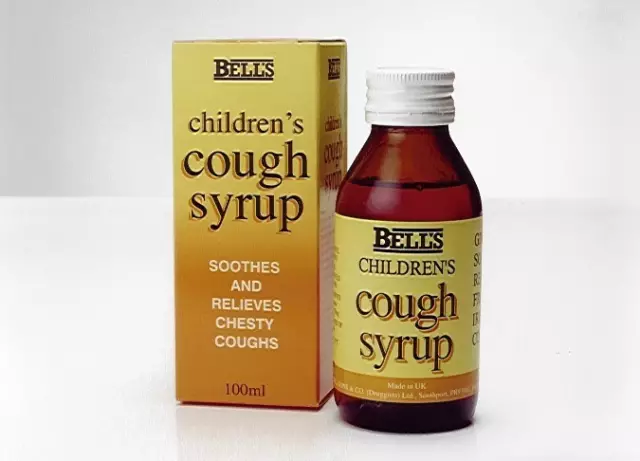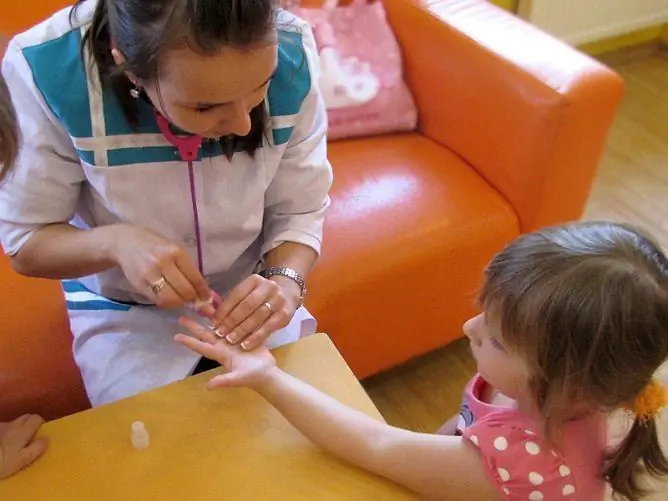- Author Rachel Wainwright wainwright@abchealthonline.com.
- Public 2023-12-15 07:39.
- Last modified 2025-11-02 20:14.
Gastritis in children
The content of the article:
- Causes and risk factors
- Forms of the disease
- Symptoms of gastritis in children
- Diagnostics
- Treatment of gastritis in children
- Potential consequences and complications
- Forecast
- Prevention
Gastritis in children is an inflammatory process that affects the gastric mucosa and is accompanied by the development of morphological and functional changes in it. This is one of the most common diseases in the practice of a pediatric gastroenterologist.
In the first years of a child's life, the digestive system is actively formed. In children under seven years of age, the concentration of hydrochloric acid in the gastric juice is less than in adults, and the motor-evacuation function of the stomach is insufficiently developed. Therefore, errors in nutrition can easily become the cause of gastritis. The highest incidence is observed at 5-7 and 10-16 years.
Gastritis in children can be acute and chronic.

Improper diet is a common cause of gastritis in children
Causes and risk factors
Acute gastritis in children can be both an independent pathology and develop as a complication of somatic and infectious diseases. Acute inflammation of the gastric mucosa can be caused by an unhealthy diet (eating too hot, fatty or spicy foods that do not correspond to age), poisoning with acids or alkalis, taking certain medications (glucocorticosteroids, non-steroidal anti-inflammatory drugs).
Often, acute gastritis in children is caused by alimentary reasons, that is, eating poor-quality foods, water infected with pathogenic microorganisms (E. coli, Salmonella, Klebsiela, Proteus). In this case, gastritis is a symptom of food poisoning.
One of the main reasons for the development of chronic gastritis in children is infection with H. pylori (heliobacterium). This microorganism is able to live and multiply in an aggressive gastric environment. In the process of life, it releases toxins and very active enzymes (phospholipase, protease, urease) that destroy the protective mucin layer and damage the epithelial cells of the gastric mucosa. As a result, local immunity is suppressed and the inflammatory process is triggered, the functions of the stomach are disrupted, erosions are formed, which can subsequently transform into ulcerative defects.

The main cause of gastritis in children is infection with H. pylori
Chronic autoimmune gastritis in children occurs as a result of a dysfunction of the immune system. Under the influence of certain reasons, it begins to recognize the secretory cells of the gastric mucosa as foreign and attacks them, destroying them.
Factors predisposing to the development of gastritis in children are:
- food allergy;
- gastroduodenal reflux;
- chronic diseases of other organs of the digestive system (pancreatitis, hepatitis);
- fermentopathy;
- acute infectious diseases (tuberculosis, viral hepatitis, diphtheria, measles, influenza);
- acute and chronic renal failure;
- radiation damage;
- burn disease.
The risk group includes children and adolescents with improper eating habits (abuse of carbonated drinks, fast food, "junk" food), suffering from helminthic invasions (ascariasis, enterobiasis), as well as psychosomatic disorders.
Forms of the disease
According to the duration of the course, gastritis in children is divided into acute and chronic. The acute form occurs under the influence of a short-term but intense effect on the mucous membrane of an irritating factor. The chronic form is characterized by a prolonged recurrent course, in which periods of remission are replaced by exacerbations. In the absence of treatment, over time, secretory and epithelial cells of the gastric mucosa undergo degenerative changes and atrophy.
In accordance with the nature of the inflammation, the following forms of gastritis are distinguished in children:
- catarrhal - manifested by edema and hyperemia of the mucous membrane, dystrophic changes in epithelial cells, the presence of single erosions and pinpoint hemorrhages;
- fibrous - necrotic changes cover the superficial and deep layers of the gastric mucosa, fibrous films are formed on its surface;
- corrosive - inflammation penetrates into the deeper layers of the stomach wall, accompanied by their ulceration and necrosis;
- phlegmonous - purulent inflammation of the walls of the stomach.

Types of gastritis in children
According to the extent of the spread of the pathological process, gastritis is divided into widespread (diffuse) and focal (pyloroduodenal, pyloroantral, antral, fundal).
Depending on the cause of the disease, the following types of gastritis in children are distinguished:
- reactive - develops as one of the manifestations of other diseases;
- associated with heliobacter infection;
- allergic (eosinophilic);
- autoimmune;
- idiopathic - the cause of inflammation of the gastric mucosa cannot be established.
Depending on the secretory activity of the glandular cells of the gastric mucosa, gastritis can be hypoacid (with low acidity of gastric juice) and hyperacid (with high acidity).
Symptoms of gastritis in children
The clinical picture of acute gastritis develops in children several hours after the moment of exposure to the causative factor. The child begins to complain of pain in the stomach, nausea, heartburn, dry mouth, or, conversely, increased salivation. Vomiting often occurs, after which the pain in the upper abdomen decreases. The duration of the acute form of the disease usually does not exceed 3-5 days.
Signs of gastritis in children of a toxic-infectious nature are:
- increased body temperature;
- headache and muscle pain;
- growing weakness, lethargy;
- repeated vomiting;
- repeated loose stools.

Signs of gastritis in children are vomiting, loose stools, fever
If the child is not helped, dehydration develops, manifested by the following symptoms:
- dry skin and mucous membranes;
- decrease in urine output;
- dark saturated color of urine;
- a strong feeling of thirst;
- tachycardia;
- lowering blood pressure.
Dehydration is a very dangerous condition that requires immediate correction.
In acute allergic gastritis in children, dyspepsia is often combined with the appearance of an itchy rash, angioedema.
Corrosive gastritis, which develops as a result of a chemical burn, is very difficult in children. Its symptoms are severe burning pain in the epigastric region, repeated repeated vomiting, which does not bring relief. The vomit contains impurities of blood, mucus, tissue fragments.
Phlegmonous gastritis in children begins with a rapid rise in temperature to 40-41 ° C, accompanied by tremendous chills. Then there are severe abdominal pains, frequent vomiting mixed with blood and pus.

Gastritis in children can lead to dehydration, a dangerous condition that requires immediate correction
With chronic gastritis in children, aching dull pains in the epigastric region are noted, which usually intensify 15-20 minutes after eating, heartburn, sour belching, nausea, bloating, unstable stools. Over time, asthenovegetative syndrome develops (increased fatigue, weakness, mood swings, irritability).
Diagnostics
Diagnosis of acute gastritis in children is usually not difficult and is based on the characteristic clinical signs of the disease and anamnesis data.
For the diagnosis of chronic gastritis, it is necessary to perform FEGDS with a mandatory biopsy of the gastric mucosa. Subsequent histological analysis of the obtained tissue allows one to assess the activity and prevalence of inflammation, the type of lesion, and the degree of H. pylori infection.

For the diagnosis of gastritis in children, it is necessary to perform FEGDS with a biopsy of the gastric mucosa
In chronic gastritis, ultrasound of the abdominal organs, survey and contrast radiography of the stomach, and intragastric pH-metry are also performed.
Gastritis in children is differentiated with the following diseases:
- salmonellosis;
- functional dyspepsia;
- peptic ulcer of the stomach and duodenum;
- helminthic invasions;
- chronic cholecystitis;
- chronic pancreatitis;
- chronic appendicitis.
Treatment of gastritis in children
In acute gastritis, children are prescribed a water-tea break for 10-12 hours. At this time, the child is not fed, but they give him to drink often and in small portions warm liquid (unsweetened tea, mineral water without gas, Ringer's solution). If indicated, the stomach is washed with a probe, a cleansing enema is given.
To reduce nausea and vomiting, prokinetics (drugs that stimulate the motility of the digestive tract) are prescribed. With severe pain, antacids and antispasmodics can be used. A pronounced intoxication syndrome is an indication for the appointment of adsorbents and antibiotics.

Medicines prescribed by a doctor help alleviate symptoms of gastritis in a child.
If a child develops dehydration, infusion therapy is performed to correct the disturbed water and electrolyte balance.
After the end of the water-tea break, the child is prescribed dietary food (jelly, boiled porridge, slimy soups with white crackers). The menu is gradually expanded and after a few days the patient is transferred to a common table with the exclusion of coarse, spicy and fatty foods from the diet. At this time, enzyme preparations may be prescribed to improve digestion.
Phlegmonous gastritis in children is an indication for emergency surgical intervention.
Treatment of gastritis in children with a chronic form of the disease is long-term and complex. It includes the following activities:
- diet food;
- medical and protective regime;
- drug therapy;
- physiotherapy;
- Spa treatment.
The diet for chronic gastritis in children should provide thermal, chemical and mechanical sparing of the gastric mucosa. Food is taken often, in small portions warm.
With gastritis with low acidity, the child is given a solution of hydrochloric acid with pepsin or Acidin-pepsin 10-15 minutes before a meal. With hyperacid gastritis, antisecretory drugs and antacids are prescribed.

A gentle diet is an indispensable component of the treatment of gastritis in children
If gastritis is caused by Heliobacterium infection, a course of therapy is carried out, including taking antibiotics, nitroimidazole derivatives, proton pump inhibitors, colloidal bismuth salts, and probiotics.
The duration of therapy for exacerbation of chronic gastritis in children is on average 3-4 weeks. After the inflammatory process subsides, physiotherapeutic procedures can be prescribed (acupuncture, hydrotherapy, diadynamic currents, electrophoresis with bromine or calcium).
After achieving a stable remission lasting at least three months, children with chronic gastritis can be referred for a spa treatment.
Potential consequences and complications
The most dangerous complications of gastritis in children develop with corrosive and phlegmonous forms of the disease. These complications include:
- perforation of the stomach wall;
- perigastritis;
- peritonitis;
- gastric bleeding;
- infectious toxic shock;
- multiple organ failure.
The development of such pathologies is often fatal even with full treatment.
Chronic gastritis in the absence of the necessary therapy can cause the development of gastric ulcer and duodenal ulcer, gastroduodenitis, cholecystitis, pancreatitis, colitis, atrophic gastritis.
Forecast
With timely treatment started, acute gastritis in children usually ends with a full recovery within a few days.
Correctly conducted therapy of chronic gastritis provides long-term stable remission. In order to prevent exacerbations in spring and autumn, anti-relapse courses of treatment are carried out.
Prevention
Prevention of gastritis in children, first of all, consists in the organization of proper nutrition, corresponding to age-related needs. It is very important to form correct eating behavior in children from an early age:
- eating at a strictly defined time;
- thoroughly chewing food;
- refusal to eat dry food and snacks;
- mandatory inclusion of fresh vegetables and fruits in the diet.
YouTube video related to the article:

Elena Minkina Doctor anesthesiologist-resuscitator About the author
Education: graduated from the Tashkent State Medical Institute, specializing in general medicine in 1991. Repeatedly passed refresher courses.
Work experience: anesthesiologist-resuscitator of the city maternity complex, resuscitator of the hemodialysis department.
The information is generalized and provided for informational purposes only. At the first sign of illness, see your doctor. Self-medication is hazardous to health!






